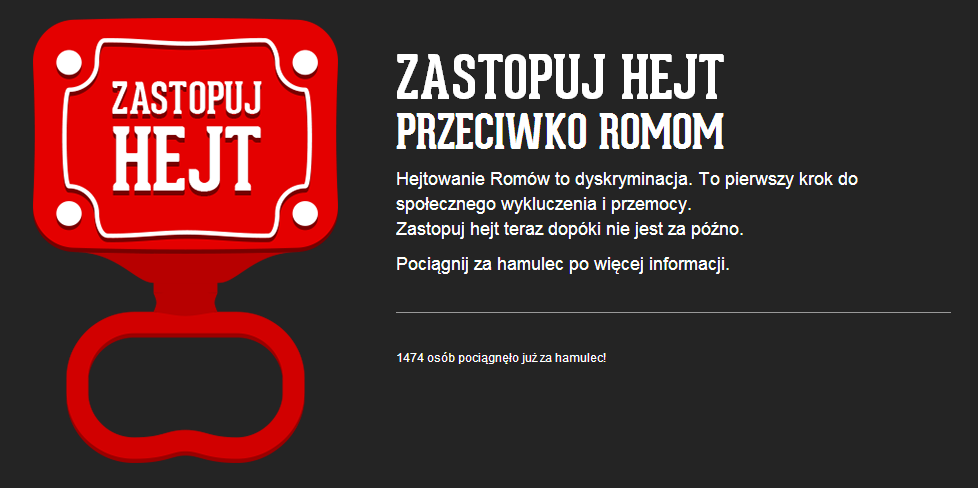As the fellowship draws to a close, I’ve begun to reflect on the various pieces of the Humanity in Action puzzle and how they’ve come together over the course of the past month. Sitting in the Museum of the History of Polish Jews, I realize that I’ve learned so much over a relatively short amount of time; knowledge, excursions, and interactions all compressed into less than thirty days. Throughout the month, we explored many opportunities and faced many challenges, but in the end we were able to pull together to create something exciting and new.
At the onset of the fellowship, we were introduced to two distinct phases: input and output. In the first phase, we were absorbent sponges, taking in an incredible amount of information on Polish history, on specific minorities (namely Jews, LGBT, Roma, and refugees), and on the subject of hate speech in general. During the output phase, we were then put into groups of three and assigned to one of these minorities. Our task was simple, yet daunting: come up with a social campaign that addresses hate speech against one of the minority groups.
Referring back to the sponge metaphor, at the end of the input phase, I was completely saturated with information. I was glad to have some sort of formal channel towards which I could direct my attention, but the task itself seemed near impossible. How were we supposed to make a social impact in a week’s time? How were we supposed to do this when only one team member per group spoke Polish, when that was the language in which the campaign needed to be in order to have a maximal reach in Poland? Our fears and concerns were many, but then Faith Bosworth from Peng Collective in Berlin came to train us, and immediately I breathed a sigh of relief. With the help of Faith and Hannes (graphic designer), our task seemed more manageable and indeed we were able to put some of our ideas into action.
Our team consisted of three people: Arne Semsrott from Germany, Sylwia Wodzińska from Poland, and me, Mil Dranoff, from the United States. Assigned to the Roma community, we had various ideas of how to go about addressing the issue. We ultimately decided to design a website to raise awareness around the issue of hate speech against Roma. Among our other ideas were mock evictions to demonstrate how Roma are evicted from their homes, and language bookmarks to show the Polish word for something and the same word in a Roma language. Because the Roma community in Poland is perceived quite negatively by a majority of Poles, our goal was to combat these negative stereotypes by educating the Polish public that saying these words is not only hateful, but also may lead to hate crimes or other forms of violence.
Our website has some useful statistics about discrimination towards Roma in Poland and also offers ways to find out more information. Our design is entitled “Pull the Brake on Hate Speech Against Roma” and it appears on an image of an emergency brake. To compliment the website, we printed out stickers with the brake logo and were planning on putting them on buses and trams to raise awareness and send people to our website. The turning point in our process was when we realized that the fine for putting up these stickers on public transit is quite high. We decided to keep the theme of transportation the same, while putting them at entrances to cafes and other public message boards. While the campaign was specifically designed to go on public transit, the main idea is still present and we are hoping that the design will still be eye-catching enough to send people to our website.
I’ve learned a great deal over the course of this week about the creative and educational processes that go into making a campaign. In order to condense these thoughts, I made a list of the top five things I’ve learned/pieces of advice I’d give someone working on a similar project:
1. Get to know your team! Go out and get coffee, or walk around the rooftop terrace of a University, or wander around the city looking for a copy shop. Spend time together and it’ll be easier to work together.
2. List all of your ideas! No ideas are bad (but some are better). If you have them all written out, it gives everyone a chance to contribute. Consider the pros and cons of each idea and that will help you decide on which one to go with.
3. There will be moments when you or a team member or all of your team members feel demoralized. This is a good time for deep breaths and re-centering. Focus on the end goal and remember that you are in this for a reason.
4. Make priority lists! There may seem like there are a million things that need to get done but if you have it all written out in front of you, you’ll realize that some steps are unnecessary and it’ll feel great to cross off the things that you do get accomplished!
5. If you are going to use guerilla tactics, either be ready to pay a fine, or don’t use guerilla tactics.











